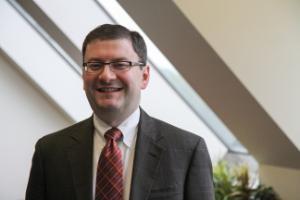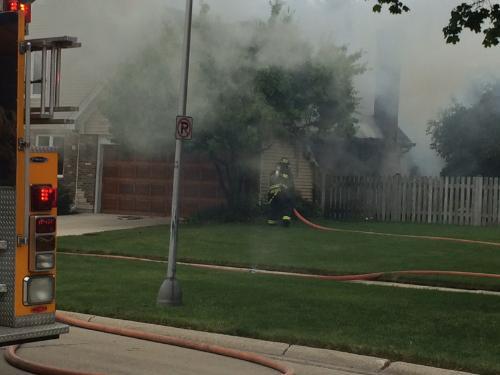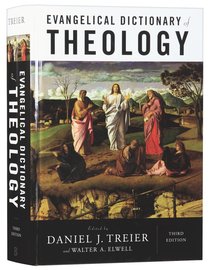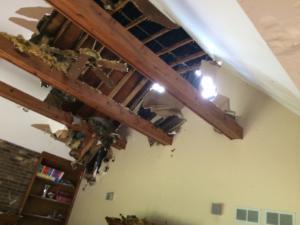July 11, 2018
 This blog features stories about the Wheaton College Graduate School. This week's story is an interview with Dr. Daniel Treier, Gunther E. Knoedler Professor of Theology and Director of the Ph.D. in Biblical and Theological Studies Program. Dr. Treier and his wife, Dr. Amy Black, Professor of Political Science at Wheaton College, lost their family home in a house fire last year. In this interview, Dr. Treier shares how his work as a theologian, writer, and academic have developed in the year since their tragedy.
This blog features stories about the Wheaton College Graduate School. This week's story is an interview with Dr. Daniel Treier, Gunther E. Knoedler Professor of Theology and Director of the Ph.D. in Biblical and Theological Studies Program. Dr. Treier and his wife, Dr. Amy Black, Professor of Political Science at Wheaton College, lost their family home in a house fire last year. In this interview, Dr. Treier shares how his work as a theologian, writer, and academic have developed in the year since their tragedy.
Theology Through Fire
This year has been full of notable events in your career and life, including the tragic loss of your home in a house fire last year. You have highlighted the importance of this event in your public talks and lectures, including your inaugural lecture as Gunther E. Knoedler Professor of Theology, "The Gift of Finitude: Wisdom from Ecclesiastes for a Theology of Education." How did the house fire influence your past year of teaching, writing, and theological development?  Dr. Treier: Obviously, we encountered our limitations in a new way, being just avalanched by life details. I’m amazed at how my wife handled so much alongside her own teaching responsibilities at Wheaton. I’m also amazed at how resilient my daughter has been; she was home with me when the fire happened, and it was surreal to stand there and watch our house burn.
Dr. Treier: Obviously, we encountered our limitations in a new way, being just avalanched by life details. I’m amazed at how my wife handled so much alongside her own teaching responsibilities at Wheaton. I’m also amazed at how resilient my daughter has been; she was home with me when the fire happened, and it was surreal to stand there and watch our house burn.
Given how overwhelmed we were, it was necessary to figure out which deadlines could move and which ones couldn’t, and to live with being less excellent than I want to be. Sometimes, though, it was helpful to focus on tasks other than insurance or rebuilding or moving, to resist knuckling under every time we felt helpless.
Limitations bring opportunities for growth and excellence, but they can’t always be resisted. Ironically, I was already working on the theme of finitude before the fire; now I have to back-burner that larger project in order to accept my limitations and fulfill another obligation on time! Even back in a rebuilt house, we face an ongoing need to make space for recovery.
Beyond limitations, we’ve learned more about privilege. It was sobering to read Matt Desmond’s Evicted while an insurance company paid our rent, and to plan rebuilding our house while people in Houston and Puerto Rico faced disasters with limited help. We’ve certainly learned about how privileged we are to have our church and our families as support structures. People from church helped us recover and wash clothes, price thousands of items for insurance, etc. Most importantly, they loved us and prayed for us.
As mentioned before, you have just been appointed to the Gunther E. Knoedler Chair of Theology in the School of Biblical and Theological Studies. How has your experience as a professor and Ph.D. advisor at Wheaton College shaped and transformed you as a teacher and theologian?
-300x225.JPG)
In subsequent years, I’ve continued to learn a lot from colleagues and students while trying to grow as a seminar leader and go deeper in my field. Ph.D. students have globalized me, stretched my comfort zones into new areas, and corrected some of my views.
Just as important, throughout my time here I’ve gotten to know very committed followers of Jesus among staff members and administrators and trustees along with colleagues and students. I realize that Wheaton has its flaws, including its so-called “bubble,” but here I’ve encountered challenges to my blind spots and been uniquely enriched by the fullness of the church.
You recently edited the third edition of the notable Evangelical Dictionary of Theology, and your own forthcoming work, Introducing Evangelical Theology, is now in the final stages of publication. Both of these projects demonstrate a desire to "make sense" of evangelical theology for an audience that includes but extends beyond the academy. How do you see your academic, systematic-theological work in relation to the church and contemporary culture?
 Dr. Treier: Both of these projects arose from trying to improve my teaching at the college while increasing its connections to local church ministries and lay Christians. Walter Elwell’s dictionary has been uniquely readable at a beginning level and representative of Wheaton’s centrist evangelical theology; I even followed a colleague’s lead and assigned it for Christian Thought on occasion. So I wanted to give it a fresh opportunity for influence.
Dr. Treier: Both of these projects arose from trying to improve my teaching at the college while increasing its connections to local church ministries and lay Christians. Walter Elwell’s dictionary has been uniquely readable at a beginning level and representative of Wheaton’s centrist evangelical theology; I even followed a colleague’s lead and assigned it for Christian Thought on occasion. So I wanted to give it a fresh opportunity for influence.
Introducing Evangelical Theology is a related attempt to distill and improve my approach to Christian Thought, partly to make it accessible for a churchly audience. I’ve been teaching some of the material in Sunday School; I find that laypeople are hungry for biblically clear, grace filled, Trinitarian shaped, theology they can make sense of. But they have follow-up questions, and so I’ve tried to write a book that presents the basics while addressing some of those questions and helping people understand why evangelical theology can involve both a broad consensus and diverging views.
For over twenty years, I’ve gathered every summer with a few friends from college and seminary for a kind of spiritual retreat (along with some recreation and storytelling, to be sure). Some of these friends are small-church pastors and missionaries who keep me aware of a real world of ministry that it’s easy for academics to avoid. I want to balance scholarly publications with helpful resources for those churchly contexts.
In the light of this eventful year, what theological truths and themes have become more real to you?
 Dr. Treier: We’ve already mentioned finitude, privilege, and the grace involved in being part of the local church. Here I can add that recent national and international tumult have certainly made me more committed to the project behind the dictionary and the textbook: helping evangelicals to learn their biblical and theological heritage well enough to be ambassadors of genuine reconciliation in Christ.
Dr. Treier: We’ve already mentioned finitude, privilege, and the grace involved in being part of the local church. Here I can add that recent national and international tumult have certainly made me more committed to the project behind the dictionary and the textbook: helping evangelicals to learn their biblical and theological heritage well enough to be ambassadors of genuine reconciliation in Christ.
A passage that has been prominent for me since the fire is Matthew 6: not storing up earthly treasures but seeking first God’s kingdom. Seeking eternal treasure frees us from worry as we learn to rest in God’s loving care. Learning not to worry would be a major indication that my heart is being reoriented toward following Jesus.
The Ph.D. in Biblical and Theological Studies is designed to train students to become skilled teachers, scholars, leaders, and researchers. The program emphasizes fidelity to the Scriptures in order to strengthen and equip the church for the future.